Exhibitions by Camões, I.P.
Exhibitions
Camões - Institute of Language and Co-operation, I.P. carries out the duties of the Ministry of Foreign Affairs in the area of culture by ensuring the promotion and spread of Portuguese culture abroad by designing, producing, proposing and promoting activities and projects to increase international awareness of all the different types of artistic expression.
Some virtual exhibitions are currently available to anyone interested in seeing them. Please complete the respective form and send it to
Once you have received the confirmation e-mail, Camões I.P. will deal with your request as soon as possible.
A follow up is guaranteed by the end of the third week day after sending the form, provided that it is completed in full accordance with Camões, I.P’s regulations.
This excludes any extraordinary situations such as an irregular influx of requests or a problem with the computer system, about which Camões, I.P. will inform the applicant at the time of request.
Find out more about the various exhibitions
Online exhibitions
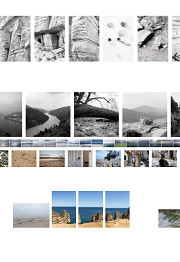 |
Lugares de Sophia "Lugares de Sophia" é uma exposição de fotografia que procura dar uma perspetiva visual à obra de Sophia de Mello Breyner Andresen, desde sempre intimamente ligada à paisagem e à natureza. Sophia acreditava que o ser se encontra no aparecer, por isso aplicava com rigor o seu olhar sobre o mundo, para distinguir as formas necessárias e definitivas, únicas capazes da revelação de uma beleza imanente que fosse sinal da verdade. Nesta exposição, os três fotógrafos, António Jorge Silva, Duarte Belo e Pedro Tropa, foram convidados a dar corpo a esse rigor da poeta.
|
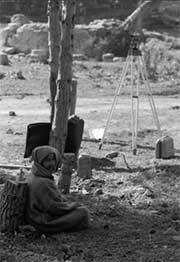 |
Alcácer Ceguer. Património Arqueológico Luso-Marroquino no Estreito de Gibraltar Alcácer Ceguer é uma antiga cidade medieval localizada no Norte de Marrocos, que foi ocupada pelos portugueses entre 1458 e 1550, dada a sua importância estratégica no Estreito de Gibraltar. De todas as localidades conquistadas pelos portugueses no Norte de África, esta foi a única que não voltou a ter habitantes após a sua partida, ficando em ruínas. As escavações arqueológicas que vêm sendo desenvolvidas por uma equipa luso-marroquina têm recuperado esta antiga cidade portuguesa, bem como os seus antecedentes. Nesta exposição conta-se a história deste sítio, mas também os trabalhos de investigação ali desenvolvidos e as próprias vivências do espaço, captadas entre 2012 e 2020 no âmbito deste projeto, em contraponto com imagens captadas numa investigação norte-americana anterior, de 1974 a 1981.
|
Digital exhibitions
 |
Luís de Camões: o futuro do passado Luís de Camões é um poeta de dimensão universal e de perene contemporaneidade. A sua obra é construída sobre a coexistência de oposições complementares. Valores em potencial conflito permanecem com uma identidade própria numa regenerativa “mansa paz, cada um com o seu contrário num sujeito”. Foi esta inovadora geopolítica da mente e da humanidade que se procurou mostrar no número 28 da CAMÕES – Revista de Letras e Culturas Lusófonas, que está na base desta exposição digital, que tem como coordenadores científicos os Professores Helder Macedo e Margarida Calafate Ribeiro. Integra catorze textos - da autoria dos Professores Ana Paula Ferreira, Carlos Ascenso André, Delfim Correia da Silva, Ettore Finazzi-Agrò, Fátima Mendonça, Inocência Mata, Luís Filipe Thomaz, Luis Maffei, Mário Vieira de Carvalho, Rita Marnoto, Simon Park, Thomas Earle, Vítor Serrão e Xu Yixing -, pontuados por ilustrações de André Carrilho, bem como os ensaios visuais “A Viagem da Camélia”, de Jun Shirasu e “Camões com um K”, de José Luandino Vieira.
|
 |
Agustina Bessa-Luís. Vida e Obra Agustina Bessa-Luís nasceu em Vila Meã, Amarante, a 15 de outubro de 1922. Apresentou-se como ficcionista aos 26 anos, em 1948, com a novela "Mundo Fechado", que enviou aos escritores então mais famosos – Aquilino Ribeiro, Ferreira de Castro, Miguel Torga e Teixeira de Pascoaes. Responderam-lhe, nas suas palavras, «com entusiasmo»; Pascoaes tratou-a de imediato por «muito ilustre camarada» e escreveu-lhe: «Trata-se de uma escritora de raça, dotada de excecionais qualidades visionárias». Mas foi com o profético título "A Sibila", de 1954, galardoado com o Prémio Delfim Guimarães e com o Prémio Eça de Queirós, que Agustina se tornou uma referência essencial da ficção contemporânea. Cruzando múltiplos géneros literários - do ensaio à biografia, do teatro à crónica, da narrativa de viagens à literatura juvenil -, construiu uma visão do mundo poderosamente original, integrando intuição e racionalismo numa espécie de sabedoria capaz de captar a essência da sua época. A expressão aforística, que nos seus romances atinge absoluto esplendor, funciona como um vendaval de inteligência insubmissa que arrasta os leitores para o campo aberto do pensamento torrencial, imune às cercas das modas e das aparências racionais.
|
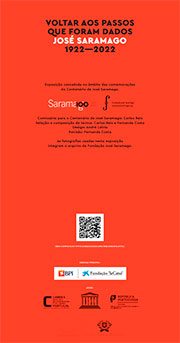 |
José Saramago: Voltar aos passos que foram dados No final de Viagem a Portugal, José Saramago diz-nos: “É preciso voltar aos passos que foram dados, para repetir e para traçar caminhos novos ao lado deles. É preciso recomeçar a viagem. Sempre. O viajante volta já”. Com a exposição “Voltar aos passos que foram dados”, com seleção e composição de textos de Carlos Reis e Fernanda Costa, e design de André Letria, aceitámos o desafio do escritor e construímos uma mostra que faz uma “viagem” pela biografia literária de José Saramago. Deduz-se daí uma “narrativa” que nos leva a encontrar ou a reencontrar, em formato expositivo, as obras e o legado cultural e cívico de um grande escritor. A exposição “Voltar aos passos que foram dados” tem um propósito de divulgação e de orientação pedagógica, permitindo um contacto de iniciação ou de revisão com a literatura e com o pensamento saramaguianos. A mostra é facultada em formato digital e destina-se a ser impressa para exibição, de acordo com as seguintes determinações:
A exposição “Voltar aos passos que foram dados” será enviada a pedido dos públicos interessados (instituições de ensino, bibliotecas, associações culturais, etc.), pressupondo a sua utilização o cumprimento das determinações referidas. Contacto: |
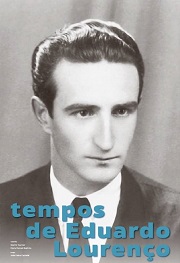 |
Tempos de Eduardo Lourenço Refletindo a fotobiografia da autoria de Maria Manuela Baptista, Maria Manuela Cruzeiro e Fernanda de Castro, a exposição revisita o perfil do ensaísta, professor, filósofo e conselheiro de Estado que Eduardo Lourenço foi. Conjugando as palavras do próprio com fotografias do seu percurso de vida delineia-se uma visão cronológica que se inicia na infância, avança pelas primeiras obras publicadas, passa pela sua vida em França até à sua consagração em Portugal e no estrangeiro. A curadoria da exposição é da responsabilidade de Maria Manuel Baptista e Beatriz Yaunner, apoio científico do Centro de Línguas, Literaturas e Culturas da Universidade de Aveiro e apoio à produção do Centro de Estudos Ibéricos.
|
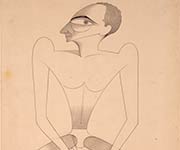 |
Almada por Contar O artista multifacetado que Almada foi: desenhador, pintor, escritor, figurinista, cenógrafo, bailarino, encenador, performer, vitralista, geómetra e sobretudo, protagonista da sua vida-obra. Mais do que uma visão cronológica do percurso artístico de Almada Negreiros, procura aqui revelar-se a unidade de uma obra vasta e heterogénea, à luz da investigação centrada no espólio disperso e largamente desconhecido do artista
|
|
|
|
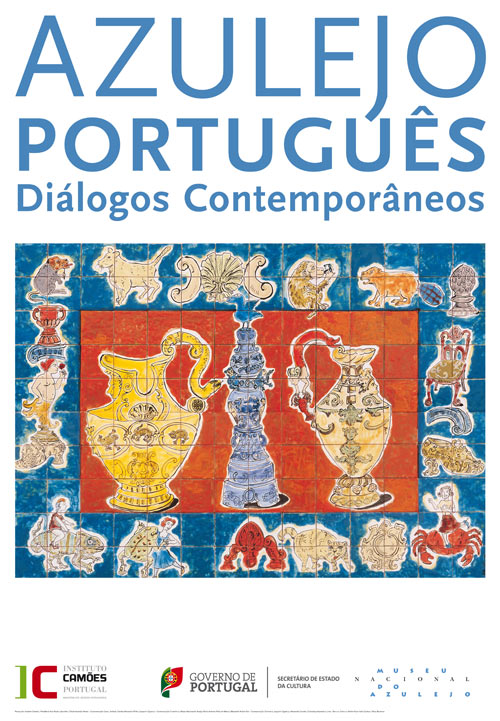 |
Azulejo Português: Diálogos Contemporâneos O azulejo radica em tradições que foram sendo atualizadas nas técnicas, cores, formas, temas, utilizações, e se apresenta como impressão digital de cultura portuguesa. O diálogo com a modernidade constitui o seu modo particular de pensar a contemporaneidade e abrir uma reflexão ao grande público ao marcar expressivamente lugares de anonimato.
|
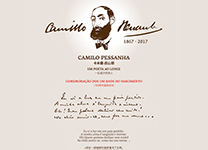 |
Camilo Pessanha. Um poeta ao longe. Comemoração dos 150 anos do Nascimento. Camilo de Almeida Pessanha nasceu em Coimbra no ano de 1867. Macau, onde chegou a 10 de Abril de 1894, foi o cenário mais constante da sua vida tendo ali ficado sepultado. Jurista, professor, poeta, é a publicação de “Clepsidra” que dá a conhecer o maior poeta simbolista português. Por ocasião dos 150 anos do seu nascimento, a Associação Wenceslau de Moraes, a Fundação Jorge Álvares e o Camões. I.P. homenageiam o Autor, com a exposição “Camilo Pessanha, Um Poeta ao Longe”, num périplo histórico que nos dá conta da sua “Família e Juventude, Pessoas e Locais”; de “Macau e a China”; de “Os Amigos”; e nos apresenta o Autor nas suas diversas facetas: “O Professor”; “O Jurista”; “O Cidadão”; “O Poeta” e “O Sinólogo”. A atual versão é em Português e Mandarim, mas em breve estarão disponíveis versões bilingues em Francês e Inglês
|
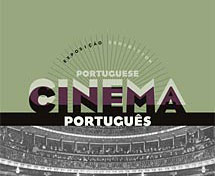 |
Cinema Português Começou cedo, em Portugal, a aventura desta viagem. Mal a invenção dessa arte maior que é o Cinema aconteceu em França, puderam os Portugueses fruir das imagens em movimento que lhes começavam a ser projetadas e, desde logo, a elas se mantiveram fiéis, integrando no quotidiano das suas vidas a magia inspiradora do que viam espelhado no ecrã.
|
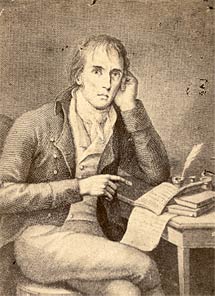 |
Da inquietude à transgressão: eis Bocage Bocage foi uma das mais complexas e notáveis figuras do Iluminismo em Portugal. Autor versátil de múltiplas formas de poesia, dramaturgo e tradutor rigoroso dos clássicos greco-latinos – Ovídio, Lucano, Virgílio, Museu e Moscho – e de escritores coevos, como, Voltaire, La Fontaine, Tasso, Racine, Delille e Madame du Bocage. A sua escrita irreverente e as contundentes intervenções públicas tornaram-no uma referência para várias gerações de portugueses. A sua obra caracteriza-se pela omnipresença do lirismo, da intervenção social, do erotismo e da sátira. Foi repetidamente invocado na literatura, nas artes plásticas, na música, no cinema, no teatro e até na publicidade.
|
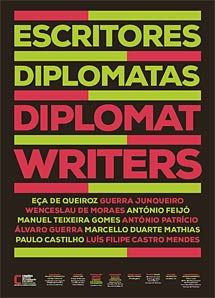 |
Escritores Diplomatas Uma seleção de 10 escritores que foram diplomatas. Iniciando com Eça de Queiroz (séc. XIX) e finalizando com Luís Filipe Castro Mendes, autor contemporâneo, em todos encontramos subjacente uma visão de abrangência cultural que resulta, explicitamente, das funções e dos contactos com culturas e problemáticas de âmbito internacional.
|
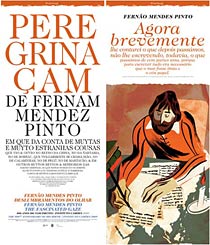 |
Fernão Mendes Pinto, Deslumbramentos do Olhar «Fernão, mentes? Minto.» Foi este trocadilho jocoso que fez passar de geração em geração o nome do autor de Peregrinação, obra que ainda antes da sua publicação gerou grande curiosidade e polémica em torno da veracidade das aventuras contadas.
|
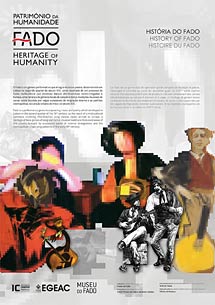 |
História do Fado O Fado é um género performativo que integra música e poesia, desenvolvido em Lisboa no segundo quartel do século XIX, como resultado de um processo de fusão multicultural que envolveu danças afro-brasileiras recém-chegadas à Europa, uma herança de géneros locais de canção e dança, tradições musicais de zonas rurais trazidas por vagas sucessivas de imigração interna e os padrões cosmopolitas da canção urbana do início do século XIX.
|
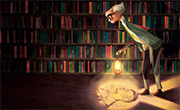 |
José Saramago: 20 anos do Prémio Nobel Exposição inédita, em português e inglês, comemorativa dos 20 anos do Prémio Nobel de Literatura de José Saramago, até hoje único autor em língua portuguesa a receber tal distinção. Com curadoria da Fundação José Saramago e realização do estúdio Silvadesigners, a exposição «José Saramago: 20 anos do Prémio Nobel» é composta por 22 painéis com fotografias de Estelle Valente, textos de Ricardo Viel e ilustrações de Gonçalo Viana que, em conjunto, traçam um panorama da atribuição do máximo galardão das Letras ao autor de Todos os Nomes, e pode ser impressa em roll-ups, de 1×2 metros, ou em papel, na dimensão de 50×70 centímetros.
|
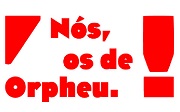 |
Nós, os de Orpheu A exposição «Nós, os de Orpheu» – título parafraseado do texto de Fernando Pessoa na revista Sudoeste 3, em 1935 –, traça o percurso da revista e dos seus protagonistas e é fruto de uma parceria entre a Casa Fernando Pessoa e o Camões - Instituto da Cooperação e da Língua, I.P. Esta exposição procurou um ângulo que permitisse apresentar a revista Orpheu e o grupo que a criou a partir dos contributos dos seus protagonistas, tanto no tempo histórico da revista, como posteriormente e a partir das memórias que estes autores e artistas nos legaram.
|
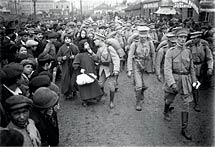 |
Portugal e a Grande Guerra: contextos e protagonistas (1914-1918) Interrogando as origens, os contextos, os impactos e as memórias da Primeira Guerra Mundial, a exposição Portugal e a Grande Guerra Contextos e Protagonistas (1914-1918) interpelam vários aspetos da participação portuguesa neste conflito global. A razão política, a mobilização social, o papel das mulheres, o mundo das trincheiras, as frentes africanas e europeias e os impactos duradouros do conflito são abordados, com recurso a uma criteriosa documentação fotográfica.
|
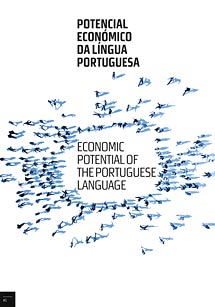 |
Potencial Económico da Língua Portuguesa Os 250 milhões de falantes do português representam cerca de 3,7% da população mundial e detêm aproximadamente 4% da riqueza total. Os 8 países de língua oficial portuguesa ocupam uma superfície de 10,8 milhões de quilómetros quadrados, cerca de 7,25% da superfície continental da Terra, possuindo todos eles amplas plataformas marítimas. A língua portuguesa é a quarta mais falada no mundo e regista uma das taxas de crescimento mais elevadas, na Internet, nas redes sociais e na aprendizagem como língua estrangeira.
|





